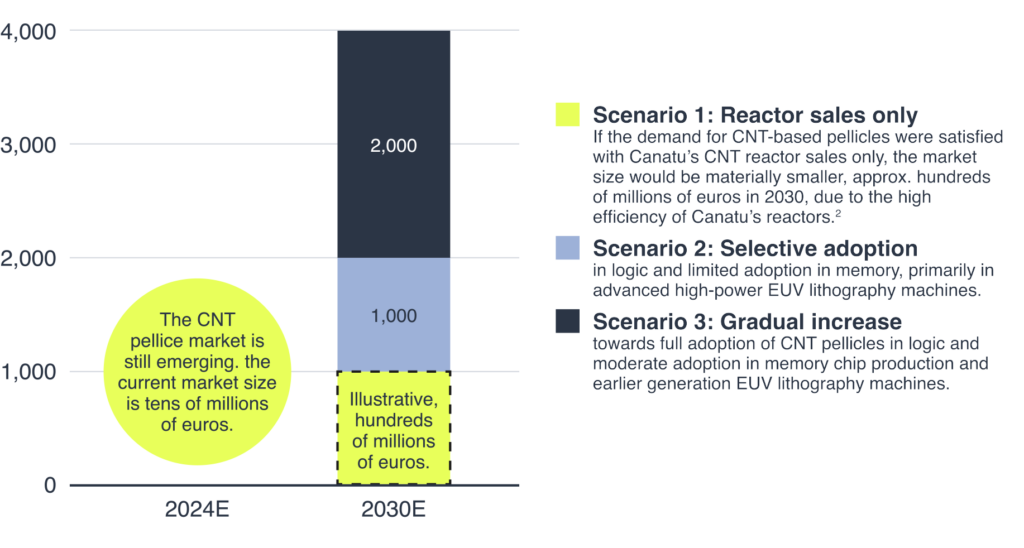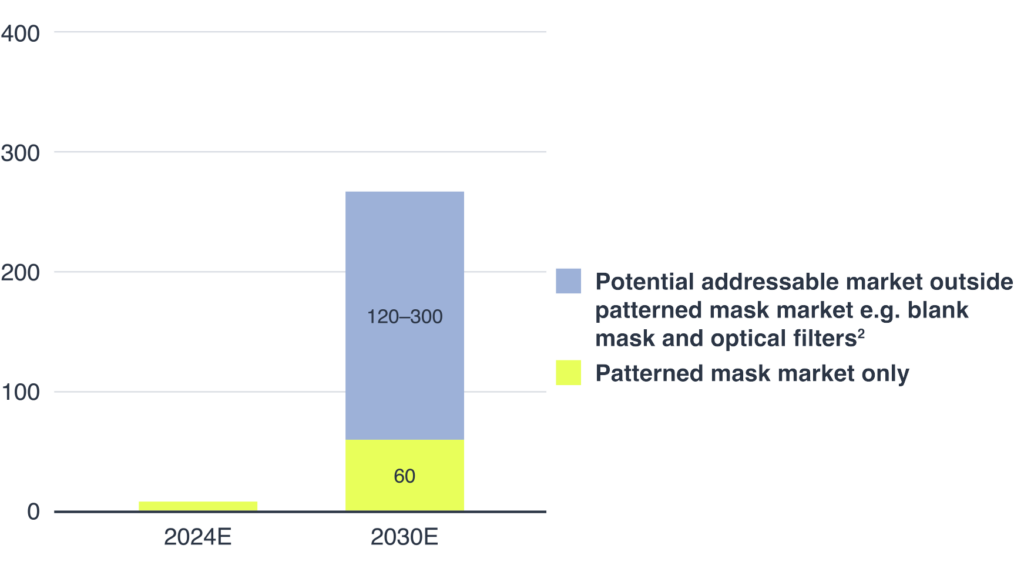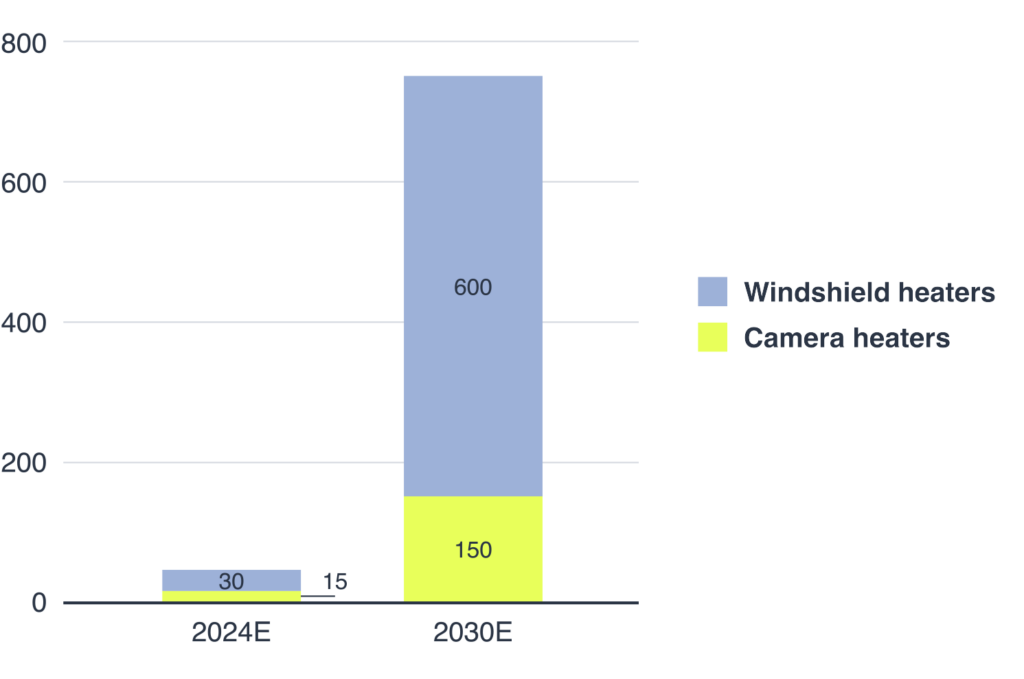
Market environment
Canatu’s current high-growth focus markets—semiconductors, automotive, and medical diagnostics—are estimated to grow to EUR 2–4 billion by 2030. These industries are undergoing a technological transformation, driving demand for high-quality CNTs and offering Canatu strong growth and profitability potential.
In the semiconductor industry, the need for advanced chips is expected to rise due to AI, with sub-7 nm chips made by EUV technology growing the fastest. The automotive sector is anticipated to shift toward assisted and autonomous driving and electric vehicles (EVs). Meanwhile, medical diagnostics is expected to increasingly transition from laboratory-based testing to point-of-care solutions in parts of the care chain. Canatu is well-positioned to support these transitions with its CNT technology, delivering high value across these industries.
Semiconductor market
The semiconductor market is estimated to offer Canatu a very large market potential of approximately EUR 1.1–2.4 billion by the end of this decade. During this period, the share of the EUV semiconductor market within the overall semiconductor market is expected to increase steadily.
CNT pellicle market
The CNT pellicle market is still in its early stages of development. Canatu’s growth in the semiconductor sector is driven by the adoption of next-generation, high-power (>500W) EUV lithography machines. These machines require EUV pellicles to protect photomasks from particle contamination. Traditional materials are expected to struggle to withstand the increased heat and mechanical stress, which can lead to performance issues. Canatu CNT pellicle membranes, produced using its patented Dry Deposition method, can offer superior properties, including higher EUV light transmission, enhanced heat resistance, and exceptional mechanical strength. Canatu CNT pellicle membranes support productivity increase potential in the EUVL process by up to 8–15%.
ASML reported strong Q4 results. Specifically, for extreme ultraviolet lithography (EUV), ASML reported EUR 3 billion in bookings for Q4, indicating that new EUV lithography system orders are already building into 2026 (44 recognized in 2024). ASML shipped the first NXE:3800E in March 2024. ASML also confirmed it shipped and recognized revenue from multiple EXE:5000 and NXE:3800 systems during Q4. These represent the first generation of ASML’s lithography systems, which are expected to require CNT pellicles or other advanced technology as the light source will reach >500W. However, ramp-up to high-volume production is not immediate and typically takes several quarters at least. Consequently, it will take at least several quarters before the CNT pellicle membranes are in commercial use, triggering the full revenue potential of royalty and recurring revenue streams for Canatu.
The CNT pellicle market is still emerging. According to our estimates, the current market size is in the tens of millions of euros. The total addressable market for CNT pellicles is projected to reach EUR 1.0–2.0 billion by 2030.
More conservative market size estimates assume selective adoption of CNT pellicles in logic chip production and limited adoption in memory chip production, primarily in advanced, high-power EUV lithography machines. Less conservative estimates assume a gradual shift toward full adoption of CNT pellicles in logic chips and moderate adoption in memory chips and earlier generation EUV lithography machines.
Canatu does not currently produce ready CNT pellicles but provides its technology through CNT reactor model for the production of CNT pellicle membranes. These CNT pellicle membranes undergo post-processing before being used as CNT pellicles on EUV lithography systems.
If the demand for CNT pellicle membranes were satisfied with Canatu CNT reactor sales only, the market size would be materially smaller, approximately hundreds of millions of euros in 2030, due to Canatu’s reactors’ high efficiency. In such scenario, recurring revenue elements such as the sale of non-discretionary (required in sales agreements) consumables and royalties would potentially comprise a very large part of the market.
Canatu’s long-term financial targets are based on the more conservative scenario, i.e. selective adoption of CNT pellicles in logic and high-power machines only, and the current CNT reactor sales business model. However, if widespread adoption occurs, it could provide material, organic upside potential beyond these targets.
Estimated annual development of addressable CNT pellicles market (EURm)1)

2) In such a scenario, recurring revenue elements such as the sale of non-discretionary consumables and royalties would potentially comprise a very large part of the market.
Inspection membrane market
The patterned mask inspection market, currently the primary application for Canatu’s inspection membranes, is expected to grow from approximately EUR 10 million in 2024 to EUR 60 million in 2030, representing an average annual growth of 33% from 2024 to 2030.
Beyond the patterned mask inspection market, other quality control phases—including EUV mask blank inspection and optical filters—could expand the addressable market for Canatu’s inspection membranes by approximately 2–5 times, bringing the total market potential to an estimated EUR 120–300 million by 2030.
The ultimate potential will also partially depend on the efficiency of customers’ own production processes i.e. if customers are able to increase their own efficiency, the demand potential for inspection membranes may be decreased.
Estimated annual development of addressable inspection membranes market (EURm)1)

2) If inspection membranes would be used beyond patterned mask inspection, the other quality control phases are estimated to expand the inspection membrane market by 2-5x, resulting in a total market potential of approximately EUR 120-300m in 2030E;
Automotive market
In the automotive sector, a key driver for Canatu’s film heater products is the adoption of higher-level autonomous driving systems (ADAS), including Levels 2–5. As automation advances, the high transmittance of Canatu’s film heaters will become increasingly important. Another major driver is the growth of electric vehicles (EVs), which require enhanced thermal energy efficiency.
In 2024, Canatu focused on developing film heaters for ADAS cameras and LiDARs, while also exploring full windshield heaters and solar cells as potential future applications. By the end of 2024, Canatu decided to primarily concentrate on camera heaters and the development of emerging applications, including future solar cells in collaboration with a strategic partner, as well as full windshield heaters.
The total camera and full windshield heater market is estimated to grow from EUR 45 million in 2024 to over EUR 750 million in 2030.
The camera heater market is projected to grow from approximately EUR 10 million in 2024 to EUR 170 million in 2030, with an average annual growth rate of 53% from 2024 to 2030. The growth is driven by the adoption of higher–level autonomous driving systems, increasing the number of sensors requiring advanced heating solutions.
The market for full windshield heaters is expected to grow strongly, driven by the increasing number of battery-electric vehicles (BEVs) with electricity consumption savings targets. This market is projected to grow from EUR 30 million in 2024 to EUR 600 million in 2030. As regards to full windshield heaters, Canatu is currently doing research and development work and exploring strategic options.
Market size and growth, (EURm)

1) Canatu’s addressable automotive market includes Camera heaters and Windshield heaters (potential future extension for Canatu);
2) Estimations based on management’s view and on the Market Study
Medical diagnostics market
Key market drivers include the shift from centralized to point-of-care (POC) testing and the increasing demand for higher sensitivity in diagnostic tests. This potential transition is driven by the growing preference for faster, more affordable, and convenient tests that can be performed at the point of care. Canatu CNT material is ultrasensitive and provides over 10 times better signal-to-noise ratio than traditional materials currently used for biosensors. This makes it ideal for quick and precise point-of-care tests.
In 2024, Canatu had no medical diagnostics products in mass production, as this domain is still under development. At the end of 2024, Canatu’s focus was on developing testing solutions for detecting paracetamol overdose, lung cancer, and breast cancer. In addition, Canatu had identified dozens of other potential applications for point-of-care tests that require high sensitivity in human and veterinary care. We expect the first product (paracetamol overdose test) to reach the market in 1–5 years. In addition, Canatu is planning to initiate the development of selected new application areas, such as virus and bacteria.